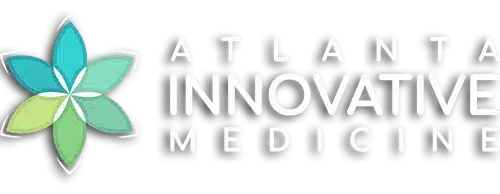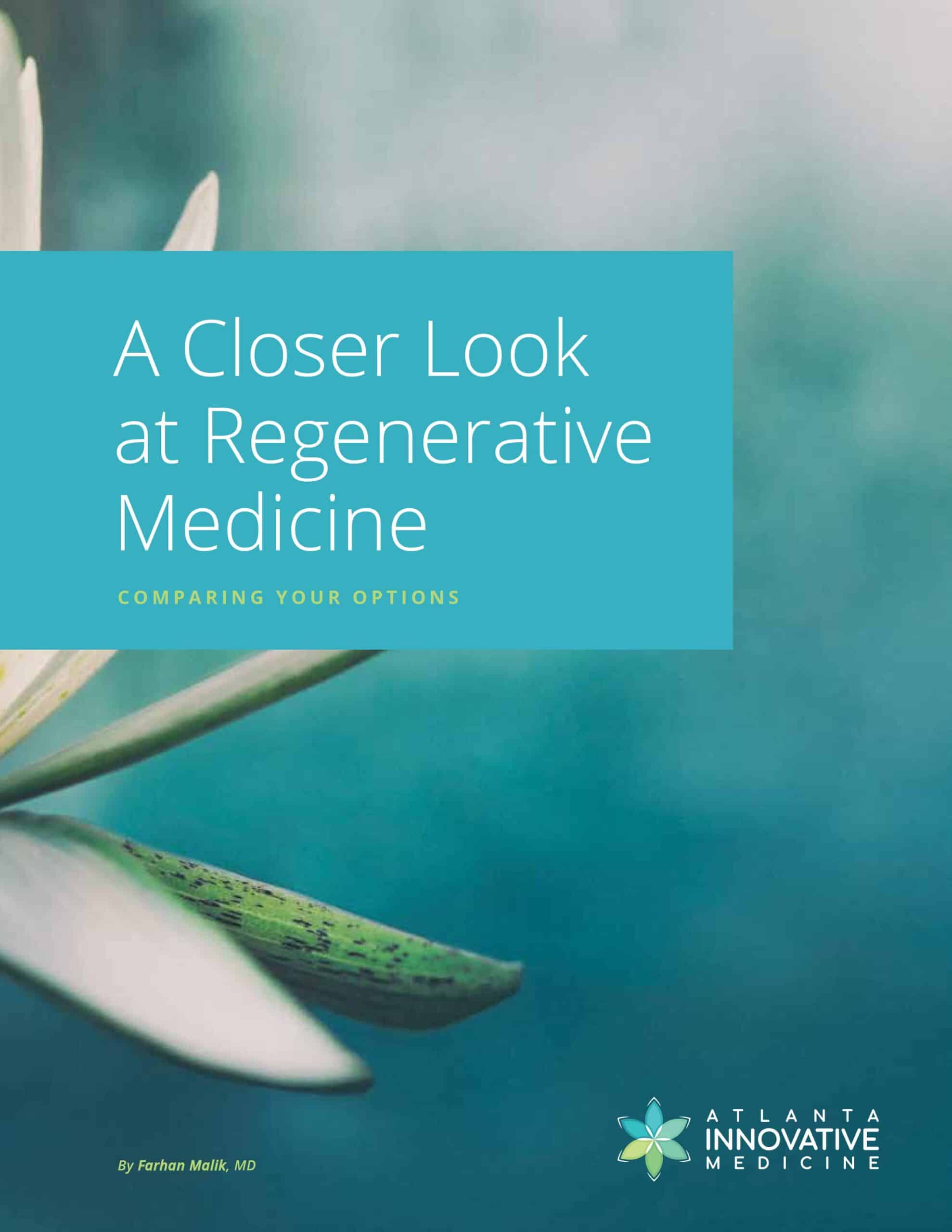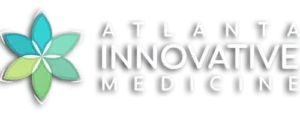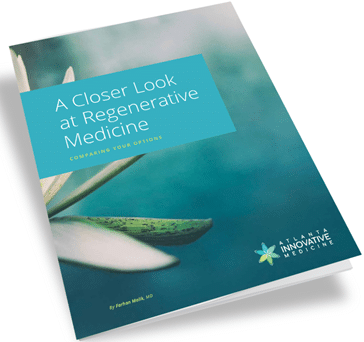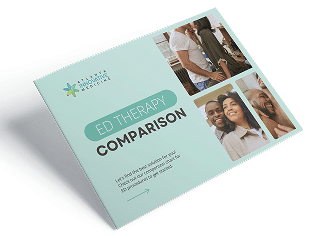By Farhan Malik, MD
Atlanta Innovative Medicine
Knee pain stinks. You want to walk, run or take the stairs without aches and swelling stopping you dead in your tracks. If you can relate, you’re not alone: one in four adults suffers with knee pain. It’s the second most common problem among the 50 million Americans suffering from chronic pain in general.
Whether you’re just learning about a knee problem or you think you’ve “tried everything,” you may be relieved to know there are nonsurgical ways of treating knee pain. That includes a world of newer therapies and proven treatments that might be your ticket to getting well and getting active again—without harsh drugs or surgery.
Discover what the pain might mean. Take the quiz.
Finding The Cause of Your Knee Pain
The type of pain and where you notice it may depend on the problem and how long you’ve lived with it. Your knee might hurt in the morning or after exercise. It might hurt when you bend or straighten the joint. There could be swelling, buckling or locking, or pain when you move it or put weight on it.
It can be difficult to pinpoint exactly what is going on. This is where a nonsurgical orthopedic and sports medicine team comes into play. Determining why your body hurts requires a visit to a team that can evaluate your symptoms, learn about your life and medical history, and conduct diagnostic tests like X-rays to see more of the knee joint.
Common Conditions
Common knee problems range from sprained ligaments and meniscus tears to tendinitis, runner’s knee, obesity and gout. For adults over age 50, the most common cause of knee pain is osteoarthritis, the “wear and tear” type of arthritis that causes the knee joint to swell or ache when you’re active.
Common Treatments for Chronic Knee Pain
For mild issues that can get better on their own, people can often speed healing with:
- RICE (rest, ice, compression and elevation)
- Stretching and strengthening exercises, including physical therapy, when recommended by a doctor
- Anti-inflammatory medications like ibuprofen or naproxen (which AIM typically does not recommend due to potential side effects)
For more severe, chronic or painful issues, people are often advised to take more severe measures, ranging from corticosteroid shots to surgery, including full or partial knee replacement. While many people turn to drugs or surgery when dealing with knee pain, this doesn’t have to be the only answer.
4 Therapies That Do Not Require Surgery
Rethinking treatments for knee pain can help you stay active while aging. Here are some approaches that do not require surgery.
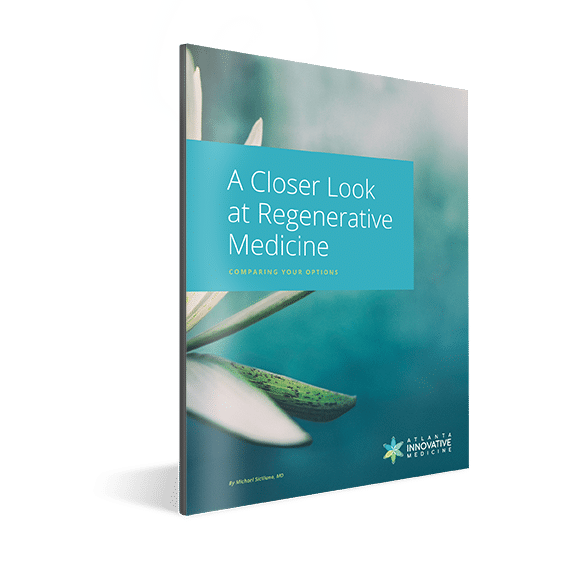
Subscribe for Expert Insights and Our Ebook
A Closer Look at Regenerative Medicine: Comparing Your Options Learn about treatment options like Platelet Rich Plasma (PRP), Prolozone Therapy, and Stem Cell Therapy.
1. Joint Fluid Therapy
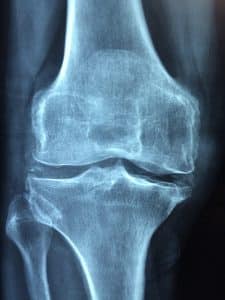
Injections are made directly into the knee joint to reduce pain and discomfort, helping protect and lubricate the joint. A physician administers an injection of Supartz solution into the knee once a week over a series of weeks.
Learn more about Joint Fluid Therapy
2. Stem Cell Treatments
Located throughout our bodies, stem cells are extremely useful because they can duplicate, change and become other types of cells. They are basically “all purpose cells,” ready to accommodate the needs of our bodies. As we age and suffer from chronic injuries, the body is not able to send the necessary amount of stem cells to an area in need of repair—such as a joint, or connective tissue—as it once could have.
These cells, also called mesenchymal stem cells (MSCs), can be harvested from highly concentrated areas within your body, including: adipose (fat) tissue, peripheral blood stem cells or cells. The cells are then concentrated and injected into the damaged joint or tissues, allowing the body to heal naturally.
Learn more about Stem Cell Treatments
3. Platelet Rich Plasma (PRP)
Platelet Rich Plasma (PRP) operates under the theory that injecting growth factors from the blood into an injured area will cause new tissues to form, reducing inflammation and promoting tissue formation. The treatment, made famous by high profile athletes in the past decade, is often used for osteoarthritis of the knee, meniscus tears, plantar fasciitis and more.
Your blood consists of solid cells, including red blood cells, white blood cells and platelets, which are suspended in a liquid called plasma. The platelets contain hundreds of growth factors, which are proteins that play a vital role in the body’s natural healing process. A small amount of blood is drawn from a patient and spun in a centrifuge, which separates the different components. The red blood cells and much of the plasma is drained away, leaving a high concentration of platelets and growth factors. This PRP, derived from the patient, is then injected into the damaged area of the body to stimulate healing.
Learn about Super Concentrated PRP (SC-PRP)
4. Growth Factors and Amplifiers: Prolotherapy and Prolozone
Regenerative medicine holds powerful promise for reducing pain and stimulating healing. That potential can be amplified when paired with treatments designed to reduce pain and regenerate tissue for improved function.
Prolozone — This injection includes collagen-producing substances and ozone gas, which can reconstruct damaged or weakened tissue in and around joints. These substances are injected into the damaged connective tissue to rebuild the knee joint area and alleviate chronic pain. Learn more
Quizzes
Are you a candidate for Regenerative Medicine?
Regenerative medicine can be an effective therapy and treatment option for lasting pain relief for a variety of conditions like osteoarthritis of the knee, hip or shoulder; ACL or meniscus tears; tennis or golfer’s elbow; chronic neck and back pain; and more.
Is it right for you and your condition? Take 1 minute to answer a few “yes or no” questions that help to assess if you might be a candidate for PRP, stem cell or other nonsurgical regenerative treatments.
Are You a Stem Cell Candidate for Your Joint or Spine Damage?
Are you a candidate for Platelet Rich Plasma (PRP) Therapy?
Do I have nonsurgical options for my injured or aging joints?
Take the Pain Medications Risk Quiz
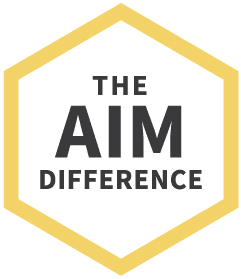
Regenerative Medicine.
Reimagined
- Advanced hybrid therapies, including Mesenchymal Stem Cell therapy combined with different mechanisms of action that synergistically come together to support ultimate healing
- More powerful PRP that’s customized, amplified and personalized
- Therapies delivered by an experienced, compassionate team comprised of multidisciplinary experts in traditional and alternative medicine working as your team: Medical Doctors, Nurse Practitioners, Physiotherapists and Chiropractors
- Advanced training through the American Academy of Orthopedic Medicine, the American Osteopathic Association of Prolotherapy Regenerative Medicine, and more
All content of this page is for informational purposes only and is not intended to serve as a substitute for the consultation, diagnosis, and/or medical treatment of a qualified physician or healthcare provider. Individual results may vary. Your medical professional can explain all the risks and potential benefits of any therapy based on your specific circumstances. At this time regenerative therapies are not FDA approved. Neither Atlanta Innovative Medicine nor its physician affiliates promise regenerative therapies as a cure for any condition, disease, or injury.
Other Atlanta Areas We Service:
© 2024 Atlanta Innovative Medicine, LLC. All Rights Reserved. AIM Scholarship Opportunity
